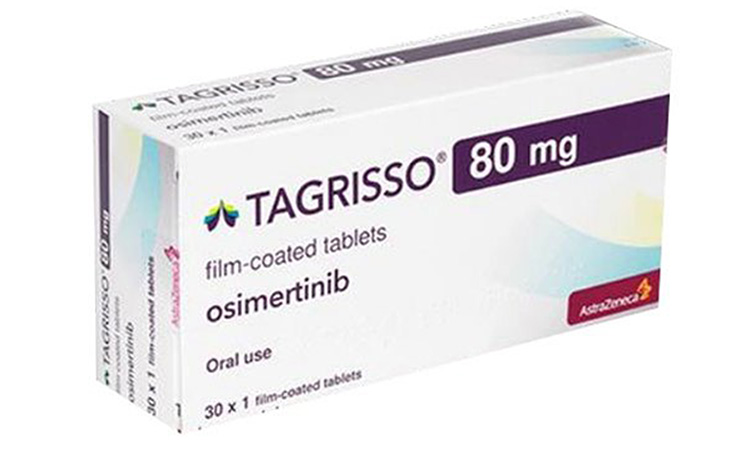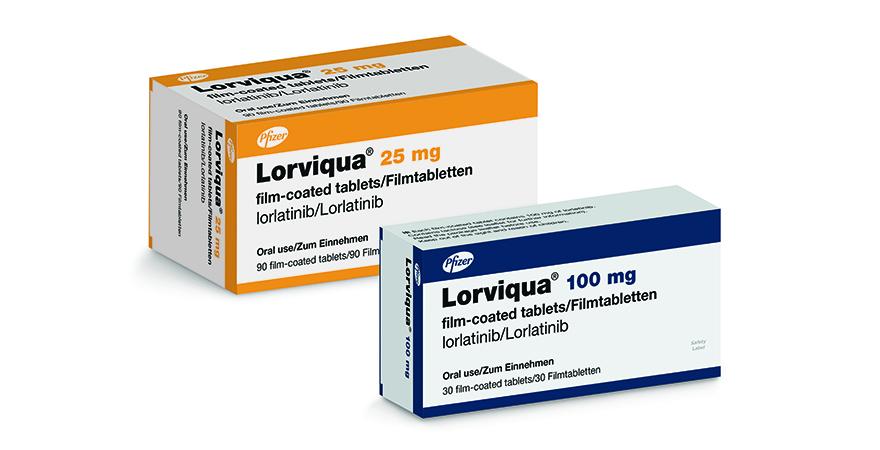Tagrisso (osimertinib) vs Lorviqua (lorlatinib)
Tagrisso (osimertinib) vs Lorviqua (lorlatinib)
Tagrisso (osimertinib) is a third-generation, irreversible EGFR tyrosine kinase inhibitor primarily used in the treatment of non-small cell lung cancer (NSCLC) with specific EGFR mutations. Lorviqua (lorlatinib) is a third-generation ALK and ROS1 inhibitor, designed to treat NSCLC in patients with alterations in these genes, and it is known for its ability to penetrate the blood-brain barrier. When deciding between the two, it is crucial to have molecular testing to determine the presence of EGFR mutations or ALK/ROS1 gene alterations, as this will guide which medication is appropriate for the patient's specific cancer profile.
Difference between Tagrisso and Lorviqua
| Metric | Tagrisso (osimertinib) | Lorviqua (lorlatinib) |
|---|---|---|
| Generic name | Osimertinib | Lorlatinib |
| Indications | Non-small cell lung cancer (NSCLC) with specific EGFR mutations | Non-small cell lung cancer (NSCLC) with ALK or ROS1 gene mutations |
| Mechanism of action | EGFR tyrosine kinase inhibitor | ALK and ROS1 tyrosine kinase inhibitor |
| Brand names | Tagrisso | Lorviqua |
| Administrative route | Oral | Oral |
| Side effects | Diarrhea, rash, dry skin, nail toxicity, stomatitis | Hypercholesterolemia, neuropathy, edema, weight gain, cognitive effects |
| Contraindications | Hypersensitivity to osimertinib or excipients | Hypersensitivity to lorlatinib or excipients |
| Drug class | Tyrosine kinase inhibitor | Tyrosine kinase inhibitor |
| Manufacturer | AstraZeneca | Pfizer |
Efficacy
Overview of Tagrisso (Osimertinib) in Lung Cancer Treatment
Tagrisso (osimertinib) is a third-generation, irreversible epidermal growth factor receptor tyrosine kinase inhibitor (EGFR TKI) used primarily in the treatment of non-small cell lung cancer (NSCLC) with specific EGFR mutations. Clinical trials have demonstrated the efficacy of Tagrisso in patients with NSCLC harboring EGFR T790M mutation, which is a common resistance mechanism to earlier generations of EGFR inhibitors. Tagrisso has shown a significant improvement in progression-free survival (PFS) compared to standard chemotherapy in this patient population. Furthermore, it has been approved as a first-line treatment for NSCLC with certain EGFR mutations due to its ability to improve PFS and overall survival (OS) when compared to earlier EGFR TKIs.
Efficacy of Tagrisso in Advanced NSCLC
In the FLAURA trial, Tagrisso has shown a substantial benefit in patients with previously untreated advanced NSCLC with EGFR mutations. The trial reported a median PFS of 18.9 months for patients treated with osimertinib, compared to 10.2 months for those receiving standard EGFR TKIs. Additionally, Tagrisso demonstrated an improved safety profile with fewer instances of severe adverse events. The results from this trial have solidified the role of Tagrisso as a first-line treatment option in this subset of lung cancer patients.
Lorviqua (Lorlatinib) and Its Role in Lung Cancer
Lorviqua (lorlatinib) is a third-generation anaplastic lymphoma kinase (ALK) inhibitor designed to target ALK-positive NSCLC. It is particularly effective in patients who have developed resistance to earlier ALK inhibitors or those with brain metastases. Clinical studies have shown that lorlatinib is effective in shrinking tumors in a significant proportion of patients with ALK-positive NSCLC, including those with central nervous system involvement. The drug has been associated with a high overall response rate (ORR) in patients who have received prior ALK inhibitors.
Comparative Efficacy of Lorlatinib in Treatment-Resistant NSCLC
In a pivotal Phase 2 trial, lorlatinib exhibited promising efficacy in patients with ALK-positive metastatic NSCLC who had progressed on one or more ALK inhibitors. The trial demonstrated an ORR of around 40% in the overall population, with higher response rates in patients who had not received more than one prior ALK inhibitor. Lorlatinib has also been shown to have intracranial activity, which is critical for patients with brain metastases, a common complication in ALK-positive NSCLC. The efficacy of lorlatinib in this setting provides an important treatment option for patients with advanced ALK-positive NSCLC, particularly after the failure of other therapies.
Regulatory Agency Approvals
Tagrisso
-
European Medical Agency (EMA), European Union

-
Food and Drug Administration (FDA), USA

-
Health Canada

-
Therapeutic Goods Administration (TGA), Australia

-
Medsafe (NZ)

Lorviqua
-
European Medical Agency (EMA), European Union

-
Food and Drug Administration (FDA), USA

-
Health Canada

-
Therapeutic Goods Administration (TGA), Australia

Access Tagrisso or Lorviqua today
If Tagrisso or Lorviqua are not approved or available in your country (e.g. due to supply issues), you can access them via Everyone.org.
How it works

Make an enquiry
Choose the medicine you want to buy, answer a couple of questions, and upload your prescription to speed things up. We’ll get back to you within 24 hours.


Make an enquiry
Choose the medicine you want to buy, answer a couple of questions, and upload your prescription to speed things up. We’ll get back to you within 24 hours.


Breeze through the paperwork
We'll guide you through the required documents for importing unapproved medicine, ensuring you have all the necessary information.


Get a personalized quote
We’ll prepare a quote for you, including medicine costs and any shipping, administrative, or import fees that may apply.


Receive your medicine
Accept the quote and we’ll handle the rest - sourcing and safely delivering your medicine.

Some text on this page has been automatically generated. Speak to your physician before you start a new treatment or medication.
Let's talk
If you have any questions, call us or send us a message through WhatsApp or email:
Contact us




